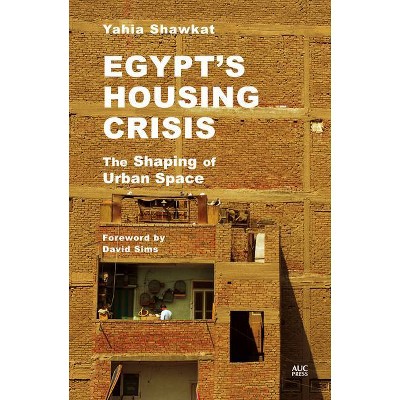Egypt's Housing Crisis - by Yahia Shawkat (Hardcover)

Similar Products
Products of same category from the store
AllProduct info
<p/><br></br><p><b> Book Synopsis </b></p></br></br><b>A provocative analysis of the roots of Egypt's housing crisis and the ways in which it can be tackled</b> <p/> Along with football and religion, housing is a fundamental cornerstone of Egyptian life: it can make or break marriage proposals, invigorate or slow down the economy, and popularize or embarrass a ruler. Housing is political. Almost every Egyptian ruler over the last eighty years has directly associated himself with at least one large-scale housing project. It is also big business, with Egypt currently the world leader in per capita housing production, building at almost double China's rate, and creating a housing surplus that counts in the millions of units. <p/> Despite this, Egypt has been in the grip of a housing crisis for almost eight decades. From the 1940s onward, officials deployed a number of policies to create adequate housing for the country's growing population. By the 1970s, housing production had outstripped population growth, but today half of Egypt's one hundred million people cannot afford a decent home. <p/> <i>Egypt's Housing Crisis </i>takes presidential speeches, parliamentary reports, legislation, and official statistics as the basis with which to investigate the tools that officials have used to 'solve' the housing crisis--rent control, social housing, and amnesties for informal self-building--as well as the inescapable reality of these policies' outcomes. Yahia Shawkat argues that wars, mass displacement, and rural-urban migration played a part in creating the problem early on, but that neoliberal deregulation, crony capitalism and corruption, and neglectful planning have made things steadily worse ever since. In the final analysis he asks, is affordable housing for all really that hard to achieve?<p/><br></br><p><b> Review Quotes </b></p></br></br><br><p/>"Very provocative"--<b>Karim Malak, <i>Borderlines</i></b> <p/> <p/> <p/>"Shawkat's book does not only offer a detailed and thoroughly referenced history of housing policies in Egypt since their introduction in the 1940s, but it also gives a thorough mapping of many elements of the housing problem, especially those related to affordability and finance."--<b><i>Al-Ahram Weekly</i></b> <p/> <p/> <p/>"An erudite, comprehensive, and impressively presented study of meticulous scholarship....very highly recommended."--<b><i>Midwest Book Review</i></b> <p/><br> <p/><br>"Combining an unprecedented breadth of concern, depth of documentary research and methodological rigor, the work is a welcome addition to a body of urban-studies literature"--<b>WJ Dorman, <i>Borderlines</i></b><br> <p/>"For scholars of Egypt and the Middle East, this is an invaluable resource. "--<b>Aya Nassar, <i>International Journal of Urban and Regional Research</i></b> <p/> <p/><br>"Convincing, well articulated . . <i>Egypt's Housing Crises </i>offers a comprehensive analysis and a series of vigorous discussions, characterized by an impartial candidness, on the evolutionary nature of crises and the contemporary condition of housing in Egypt . . . Commendably accessible . . . a must-read by policy- and decision-makers." --<b><i>Middle East Journal</i></b><br> <p/> <p/>"Without doubt my Middle East Urban Studies highlight of 2020. No one knows more about the ins and outs of Egypt's built environment than Shawkat and the depth and breadth of his knowledge is on full display in this volume. Shawkat produces a sweeping historical survey, from the early 1900s to the present day, of Egypt's never ending housing crisis. The archival research that Shawkat has undertaken for this book is awe inspiring. Housing has always been at the center of Egyptian social life and now it finally has a book that meets its match."--<b>Deen Sharp, <i>Arab Urbanism</i></b> <p/><br> <p/> <p/>"Shawkat's volume goes against the tide of leftist critiques of free markets and their calls for greater government intervention and subsidies for 'affordable housing.' Indeed, the story he tells is of the damage done by governments and the ingenuity of Egyptians working around regulations. He charitably, and possibly accurately, attributes the government's actions not primarily to corruption but to its preoccupation 'with modernist, "scientific," and dirigiste principles' and with 'an obsession with top-down, engineered urban development, ' to quote David Sims' superb foreword. . . an interesting and intriguing read." --<b><i>Middle East Quarterly</i></b><br> <p/> <p/><br>"A great deal has been said and written about Egypt's perpetual housing 'crisis' over the past three decades. This book offers the first comprehensive examination of the housing question from the historical, political, economic, and spatial outlooks. Written by one of the most erudite observers in the field, it addresses a critical question that lies at the heart of the social-policy crisis and popular contention."--<b>Asef Bayat, University of Illinois, Urbana-Champaign</b> <p/><br> <p/>"<i>Egypt's Housing Crisis </i>provides novel insights into the historical evolution of the varied causes and consequences of Egypt's housing problems, focusing primarily on the vicissitudes of successive postcolonial regimes' ideologies, discourses, and policies in contexts of unprecedented urbanization and heightened demand for housing. Shawkat combines superb archival research with critical analyses to lift the veil on a multi-layered and apparently opaque housing system, characterized by capricious assertions of power at all levels of society. Ordinary Egyptians' experiences of informality and insecurity, particularly in times of neoliberalism, are constantly foregrounded to give a human face to an apparently intractable housing crisis."--<b>Noor Nieftagodien, University of the Witwatersrand</b> <p/> <p/> <p/>"Finally, a tour de force that explains, historicizes, and critiques Egypt's poorly targeted, ineffective, and unfair housing policies which have excluded those in need from decent housing while producing millions of vacant apartments in rural and urban areas. Shawkat's seminal contribution convincingly unpacks the complex but traceable legislative, financial, social, economic, and political roots of this untenable housing environment over eight decades."--<b>Diane Singerman, American University</b> <p/> <p/><br><br>
Price History
Price Archive shows prices from various stores, lets you see history and find the cheapest. There is no actual sale on the website. For all support, inquiry and suggestion messagescommunication@pricearchive.us




















